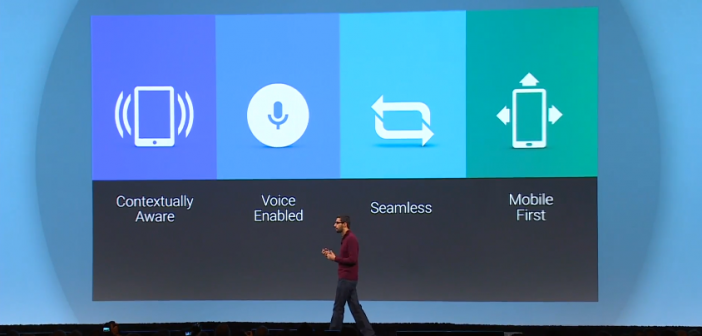Google is expanding the variety of interfaces for Android, including cars, TV and wearables. Android Wear had already been announced prior to the event, but we got our first look at Android TV and Android Auto at Google I/O earlier today.
Android Wear
Android Wear has been previewed heavily, new integration with geolocation offers more contextual information and Google showed off some of the one-touch payments and navigation available on Android Wear SDK.
The Android Wear devices available this fall will not only be the LG G Watch and Moto 360, Samsung has also built the Gear Live running Android Wear. Both the LG G Watch and Gear Live will be available later today, the Moto 360 will be available later in the Summer.
Android Auto
After Google announced the Open Automotive Alliance, it was only a matter of time before we got a full SDK and interface for Android in a Car. Today, Google announced Android Auto, which will be coming to some cars by the end of the year.
Android Auto has various features, there is a button available on the car horn to open Google Now voice recognition. The user will be able to play music, reply to messages and get turn-by-turn navigation, thanks to Google Maps.
Android TV
The third new interface is Android TV, a new interface that will replace the dying Google TV. This new interface will show live-TV, content on demand, different applications and even games from mobile.
Voice recognition has been added to Android TV and Search has been enabled, for users to find an actor, TV programme or movie in a few words. There are plenty of apps already available like Netflix, Eat 24 and iHeart Radio, alongside others.
Android TV will work with a controller, physical remote or even the user’s phone, tablet or wearable. Android TV will work on multiple different TV platforms, including HDTV, set-top boxes, gaming consoles and even gaming USBs like GameStick.
The store will open this fall and already Google has partnered with Sharp and Sony to deliver 4K quality TVs with Android TV installed. The ADT1 SDK will be available for developers to create content for the big screen.
Chromecast also got an update to Backdrop, allowing users to add different types of images of the background of the Chromecast when it isn’t playing video or other media. Google has improved latency and now friends can show their videos, without the need to sign into the WiFi network.



